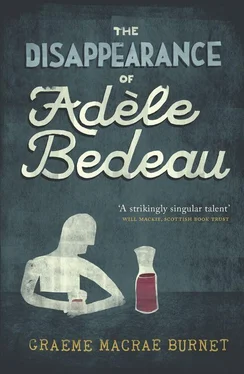‘It’s quite common for migraine to rear its head in someone your age. Often the frequency of attack decreases and, in time, it can even disappear completely.’
Faubel instructed Manfred to keep a diary of everything he ate and drank, what exercise he took, his sleep patterns and whether he was feeling anxious or depressed. He was to make another appointment when he had experienced another two painful episodes, at which point they would review his journal and see if they could identify any triggers for the attacks. The most important thing in combating migraine, he said, was to establish a routine and stick to it.
Manfred left the doctor feeling downhearted. As instructed, he kept a journal for the next two weeks, but as he did not experience an attack in this period, he let it lapse and never made the return visit to Doctor Faubel.
As the school year wore on, Manfred’s aloofness and indifference to his peers seemed to exert a certain fascination upon some of his female classmates. He had matured into a good-looking young man and his lack of attention to his appearance perhaps struck these girls as possessing a certain charm. One girl, Sonia Givskov, took to hanging around Manfred during lunch hour, sitting in his vicinity and passing remarks about whatever book he was reading. She had a large nose, matronly breasts and thick lips, and wore unfashionable clothes, which Manfred suspected her mother made for her. Before the events of the summer Manfred would have felt her a kindred spirit, but now he felt nothing but contempt for her. She was not Juliette. Yet the more dismissively Manfred behaved towards her, the more she appeared to be in his thrall. He did not have the heart to shoo her away and out of some vague principle he refused to actually avoid her, so they took to sitting together, mostly in silence. Occasionally, Manfred heard mocking remarks about Sonia Givskov now being his girlfriend. But such tittle-tattle meant nothing to him. The idiots around him had no idea who they were dealing with. Nor would he betray Sonia Givskov by contradicting them.
In another way this arrangement with Sonia suited Manfred. Despite the fact that he had no desire to ever be with anyone other than Juliette, the school environment conspired against him. He could not fail to notice the down-covered napes, tanned calves and saucily revealed bra-straps of the girls around him. He initiated a rigorous regime of masturbation, performing the act first thing in the morning and as soon as he returned home from school, whether he felt the urge or not. It had been a lack of control over his sexual desire that had led to the death of Juliette and he made a pact with himself to curb this malevolent force at all times. The perception that he and Sonia Givskov were an item meant that other girls kept their distance. She acted as a buffer.
Manfred let his schoolwork slide. In his state of numbness, he no longer cared what happened, neither in the here and now of school, nor in the future. He did not deliberately flunk tests. He simply no longer knew or could be bothered recalling the answers. He had never been popular with his teachers. Despite his good marks, he lacked charm. He sat at the back of class, never put his hand up and when called upon answered in monosyllables. He was surly. The only person who appeared to notice Manfred’s drive to failure was his French master. M. Becault was in his twenties. He wore an unconvincing ginger beard and dressed in corduroy trousers, cheesecloth shirts and tweed jackets, as if these middle-aged clothes would somehow bestow authority on him. His beard, Manfred observed, disguised a weak chin and slack mouth, but he was otherwise a pleasant-looking man. In the corridor he would form his lips into a thin smile and nod almost deferentially when passing one of his students. Becault committed the cardinal sin of the novice teacher: he wanted to be liked. Consequently, he suffered continual discipline problems. He regularly blushed when texts alluded to the sexual act. Becault had always been Manfred’s favourite teacher.
Once or twice in previous years the pair had chatted uneasily for a few minutes after class. Shortly after the death of his mother Manfred had written an essay on The Outsider. ‘The real shock of The Outsider, ’ he wrote, ‘ is not Mersault’s indifference to his mother’s death. Rather it is the animosity of others towards this indifference .’ Becault had read these lines back to Manfred and asked him what he meant. Manfred shrugged. He was both flattered by Becault’s attention and embarrassed. In truth, he was not sure what he meant and he suspected that Becault was using this as an attempt to get him to ‘open up’ about his own bereavement. When Manfred failed to articulate anything, the conversation fizzled out. ‘Well, it’s an excellent essay,’ Becault had said, handing it back.
Despite the abortive nature of this conversation, Manfred felt some sort of kinship with Becault. He pictured his teacher as an awkward, disillusioned teenager, always on the outside looking in. For a while he entertained fantasies about meeting Becault in a café to discuss books or other worldly matters. They would smoke and drink coffee together. Sometimes Becault would pause and chat for a few moments in the canteen about whatever Manfred was reading. On account of his weak manner and eccentric appearance, there were rumours that Becault was a homosexual. When he stopped to talk, Manfred was conscious of other students’ eyes upon them. Nothing would have pleased Manfred more than to engage in discussion, but it was not politic to do so. Invariably the situation became awkward and Becault would take his leave with a limp comment such as ‘Best be getting on,’ or ‘Mustn’t keep you from your lunch.’
A few months into the school year Becault asked Manfred to stay behind at the end of class. Manfred slouched in his seat at the back of the room. Becault perched on an adjacent desk. He had shaved off his beard during the summer. The flesh around his mouth was pink and flabby.
‘You don’t seem yourself,’ he said.
‘I wish I wasn’t myself,’ said Manfred.
Becault smiled, as if to himself, and exhaled a little laugh through his nose.
‘I’m concerned,’ he said. He proffered an essay Manfred had written on Gide. ‘This is…’ He let his sentence trail off with a shake of his head. Manfred shrugged.
‘You used to be my star pupil.’
‘I don’t like Gide.’
The teacher seemed encouraged. ‘It’s not a question of liking Gide,’ he said. ‘This is nothing more than a rant. You used to write so well. You had insight.’
Manfred stared at the front of the room.
‘I just want to help you,’ he said.
Manfred said nothing.
Becault pursed his lips. ‘How are things at your grandparents? You’re living with your grandparents, aren’t you?’
Manfred turned and looked at him. He imagined the little daydream he must nurture of fostering his students, of providing them with pastoral care. Probably he went home at night and struggled over a novel about a homosexual provincial schoolteacher in love with one of his pupils. But he had no idea that he was dealing with the Beast of Saint-Louis. Manfred scraped his chair back across the linoleum floor and got up.
‘I don’t need the help of some sad faggot,’ he said. He gathered up his bag and jacket and left the room. Becault remained on the desk at the back of the room for some time. He left the teaching profession the following term.
BY WEDNESDAY MORNING, Manfred’s excitement at the prospect of meeting Alice Tarrou had given way to a kind of dread. It was inconceivable that he could pass an evening in the company a woman like Alice without embarrassing himself in some way. He spent the day concocting reasons to break the appointment, but could think of nothing credible. In any case, Alice had not given him her telephone number, so, short of loitering in the foyer, he had no means of contacting her. His only option was simply not to turn up at the appointed hour. But even setting aside the discourtesy of such an act, he was bound to run into Alice again at some point and he imagined that she would not be the type to take such a snub lightly. He had no choice but to go through with it.
Читать дальше












